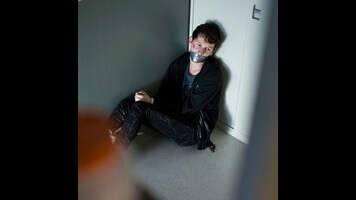Roughly three-quarters of the way into The Mist’s first (and only?) season, it’s fair to say this series is yet another exhibit in the Museum Of Failed Stephen King Adaptations, displayed somewhere next to 1993’s The Tommyknockers and around the corner from this weekend’s The Dark Tower. For what it’s worth—and it’s not much—I do think Spike TV’s The Mist is a prime example of exactly why the horror author’s work does not, despite the rare exception, translate to screen. What sets King apart from every other writer in his genre is not only an ability to conceive grotesque, violent, occasionally cocaine-fueled nightmare scenarios but also a consistent aptitude for filling those scenes with grounded human beings we don’t just relate to, but root for. But to really get a sense for that juxtaposition—the horror vs. the humanity—you almost need an inner dialogue to guide the viewer through the darkness. Without it, you end up running blind through this heightened world, jumping from one fucked-up situation to another, with barely an explanation as to why.
Take, for example, every single thing that happened inside the mall during this episode, which was titled “Over The Hills And Through The Woods” despite the presence of zero grandmothers or houses. Over the course of seven episodes, those staying in the mall’s lower level have quite simply gone insane, fighting over food rations—“I’m starving, man,” is such a terrible excuse, by the way—conspiring against their neighbors, and just generally acting less like frightened people and more like your run-of-the-mill Walking Dead villains who turned to eating people after the zombie apocalypse. “You don’t have any business here!” Shelley DeWitt screams at the mere sight of Eve, I guess because her daughter kind of, almost lied about the time she met a giant horrifying mist-monster.
But who are these people, and what were their lives before the mist? Besides Shelley, do any of them even have names? It’s growing increasingly hard to care about a crew of unintelligible angry faces, growing week-to-week more frantically unrealistic. There are several ways to make this characterization work—fear makes people do irrational things, after all—but this particular attempt falls apart because it hinges so strongly on the logic-leap from “Alex lied about the black monster” to “Alex lied about getting raped.”
And that, above all, is The Mist’s biggest mishandle. This show is leaving the true events of that high school party purposefully ambiguous to build intrigue, to draw out tension. But this isn’t Westworld stringing along clever clues to a hidden time jump; this is a teenage girl’s sexual assault. It’s undeniably skeevy that the writers are treating that traumatic experience with equal attention as the spooky mist that makes you see giant bugs, like the eventual discovery of the rapist’s identity is a big reveal, like it’s a twist.
It’s frustrating. Because in the sense of narrative logic, performance quality, and an overall ability to make you feel anything, The Mist is—to put it in the simplest possible terms—a bad TV show. But there is a difference between straight-up “bad” and entertainingly “bad,” and every so often this series treads that line like a drunken tightrope walker. Scene to scene, and sometimes moment to moment, The Mist is either infuriatingly baffling or just downright poorly made, a hard-to-watch car wreck shrouded in heavily green-screened fog. But amid the mess, it is just thrilling to write that the Four Horsemen Of The Apocalypse emerged from the mist to shoot a priest with a bow and arrow while a naked Frances Conroy looked on.
That is such an absurd, macabre plot point, so blatant in its weirdness—hell, I’d even say silliness—that you have to smile and applaud. But that’s also why I say it’s frustrating; it makes you wish for a version of The Mist that didn’t bog itself down by trying (and failing) to take itself so seriously 90 percent of the time. That’s the only surefire way to avoid the Stephen King Curse: Don’t try and dodge the innate awkwardness that comes with adapting his work, but lean into that natural discomfort to create something equally unnerving (like Kubrick’s The Shining) or, at least, as endlessly entertaining (like 1985’s batshit Gary Busey-starring werewolf tale, Silver Bullet).
Speaking of: While checking to see if that film is even titled Silver Bullet (it’s been a long time), I came across the late, great Roger Ebert’s take on the movie. The three-star review starts with this classic description: “Silver Bullet is either the worst movie ever made from a Stephen King story, or the funniest. It is either simply bad, or it is an inspired parody of his whole formula.” With all due respect to Mr. Ebert, I think that The Mist, somehow—against all laws, odds, and logic—has come along to be all of those things at the same time.
Stray observations
- The interactions between Adrian and Tyler, which took up a significant bulk of this episode, featured some genuinely sweet moments but ultimately felt useless and hollow. Adrian is still Adrian, and Tyler is no closer to accepting who he really is. Like many moments on The Mist, much happened here, yet nothing changed.
- The string of words that woman recites in Jonah’s (formerly known as Bryan) recalled memory are “smile, bike, lamp, table, orange, pen, pear, stoplight, feline, mist.” The second letter of the first three words spell out “Mia.” That doesn’t mean anything, but we all have to find our ways to keep engaged.
- The mental patient named Nash posing as a psych-ward doctor was probably the most well-orchestrated, genuinely chilling twist this show has pulled off to date. With that said, I genuinely laughed out loud at the super intense mean mug Kevin flashed at Nash after screaming “Look me in the eye and tell me you don’t see evil!”


 Keep scrolling for more great stories from A.V. Club.
Keep scrolling for more great stories from A.V. Club.